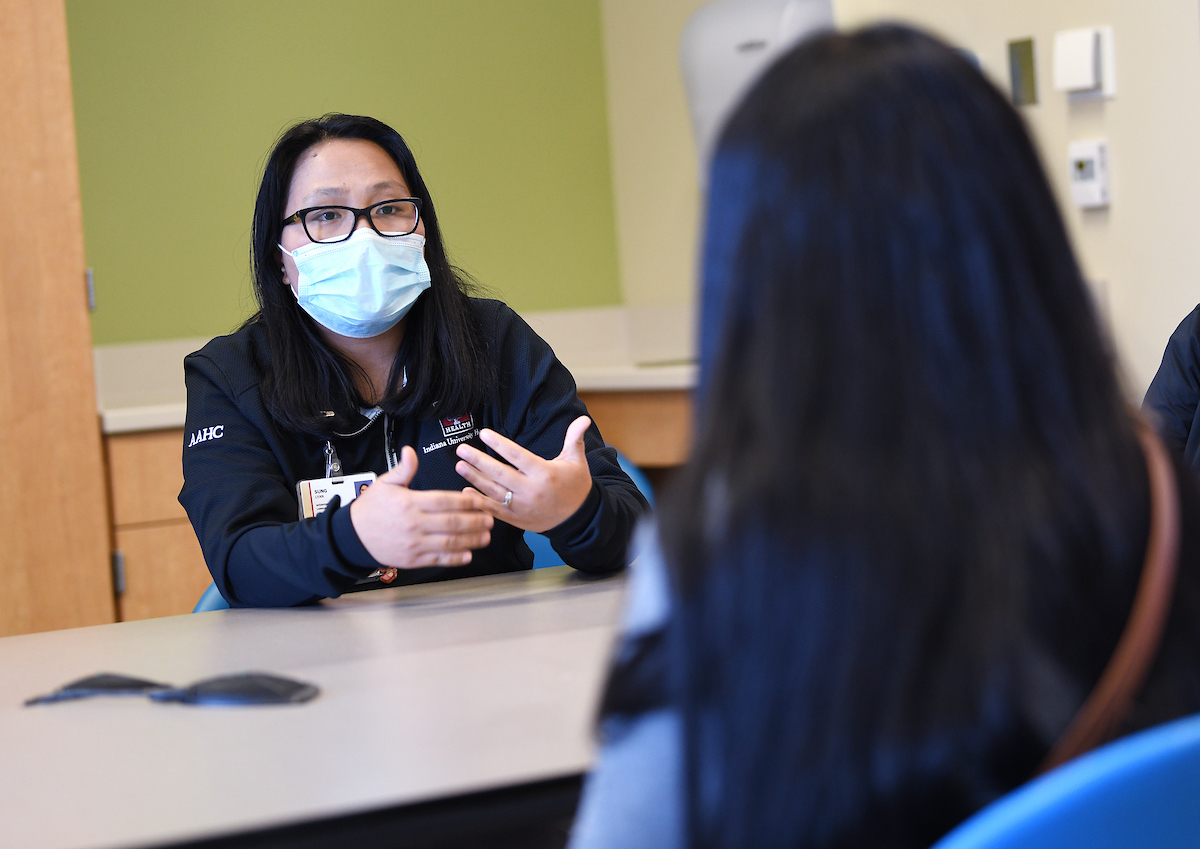Sung Lyan offers comfort and understanding to patients and families as part of IU Health’s language services team.
By Maureen Gilmer, IU Health senior writer, mgilmer1@iuhealth.org
If a smile can be considered part of a universal language, then Sung Lyan is already an excellent communicator.
She was just a teenager when she came to the United States with her father from Burma (also known as Myanmar) in southeast Asia.
The only English she knew was “OK,” “yes” and “thank you,” she recalled.
Imagine the struggles she faced as she attempted to navigate high school. She remembers sitting in computer class one day when the teacher made a joke and everyone laughed except her.
“They looked at me, so I started laughing, then they stopped and I was the only one laughing.”
She had no idea what the teacher had said, but she felt the pain of embarrassment in that moment, and ever since, she has made it her mission to help others understand.
It all starts with a smile.

For the past three years, Lyan has served as a Burmese interpreter on IU Health’s language services team, spending most of her time at Riley Hospital for Children, though she also assists adult patients and families at IU Health Methodist and University hospitals.
Within Riley, she is called to interpret for parents and caregivers frequently in the Maternity Tower, NICU, Burn Clinic and other inpatient units.
Burn Clinic nurse Angela Seitz is one of many front-line clinicians who are grateful for Lyan and the interpretive team.
“Sung Lyan is amazing. She works very hard for our Burmese population in the hospital and is very helpful with us in Burn Clinic all the time,” Seitz said. “I can’t do my job without these interpreters helping me with families.”
Helping comes naturally to Lyan, a wife and mother of three boys. As a teen, her dream was to become a nurse, but life got in the way. When she first joined IU Health, she worked as a PCA at University Hospital, and she is now once again hoping to follow the path toward her nursing degree.
But for now, she uses her voice and her compassion to help fellow Burmese navigate sometimes scary days in the hospital.
“After having kids, I put myself in the parents’ situation,” she said. “They see doctors talking to each other about their kid, and they don’t know what they’re talking about. Having your kid’s diagnosis in your own language makes a big difference.”

She draws from personal experience when she is asked to come to the burn clinic at Riley. Her middle son suffered second-degree burns as a toddler in Kentucky, so she is familiar with the treatments patients receive and the questions parents have.
“The information I knew taking care of my son at that time is helpful for them.”
As a certified medical interpreter, she is trained in terminology often unique to healthcare, whether it is specific to a diagnosis or instructions on how to care for a patient’s feeding tube.
But to her it is about more than words.
Parents look to her for comfort and understanding, often in the worst times.
“Sometimes I have to deliver bad news. It’s hard,” she said. “I mentally prepare, and I pray to God that he will give me strength. Sometimes I pray with the family at the end to give them strength.”
And before they go to bed at night, she and her children pray for the sick kids at Riley, she said.
Rafael Mendez, interim manager for the Academic Health Center’s Language Services six-person interpreter team, credits Lyan for her passion and dedication to patients.
“Sung Lyan is an essential part of our team, helping our organization reduce health disparities in the communities we serve,” he said. “Her contribution to patient outcomes by providing clear communication between patient and provider is just one aspect of her role.”
She is also a cultural asset for patients needing to navigate the healthcare system, as well as a dependable resource for providers to offer culturally appropriate responses to their patients, Mendez said.
“Her skills and knowledge are invaluable and instrumental in carrying out the mission of our organization.”
Lyan said it’s only possible because of her co-workers on the language services team.
“A lot of people do not recognize us – sometimes we feel a little invisible – but we are here for the patients,” she said. “I really appreciate my co-workers and I can see how much they love their jobs. I just do what I can to make it even better.”
Photos by Mike Dickbernd, IU Health visual journalist, mdickbernd@iuhealth.org
